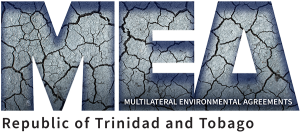
Land Degradation and Desertification
Land Degradation and Desertification Homepage
What is the issue?
Land degradation poses significant problems to both to humans and the environment. In T&T, land degradation primarily manifests through deforestation that reduces the vegetation cover, soil salinization resulting from poor agricultural practices, land contamination from inappropriate waste disposal and slope instability/landslides as a result of a lack of suitable civil infrastructure. Severe weather and other events experienced in the Caribbean such as hurricanes, storm surges and forest fires also significantly contribute to land degradation and loss of soil productivity.
What is the United Nations Convention to Combat Desertification?
Despite its name, the UNCCD also pertains to land degradation in regions that are not affected by arid conditions or drought, which includes the Caribbean. The UNCCD sets out as two (2) of its main goals to provide scientifically justifiable solutions for land degradation so as to improve the living conditions of people living in affected areas, and to improve the integrity or condition of degraded areas through appropriate technologies, land use choices and practices.
The Convention is organized on a regional basis with Trinidad and Tobago falling into the Group of Latin America and the Caribbean (GRULAC). Each region has a Regional Action Programme which cascades into a Sub-Regional Action Programme and finally a National Action Programme (NAP). Action programmes detail the principles of Sustainable Land Management (SLM) as well as a roadmap for the implementation of those principles. The Secretariat of the Convention provides technical support for the formulation of Action Programmes as well as guidance for the funding of associated projects.
UNCCD entered into force in December 1996, and Trinidad and Tobago became a Party to the Convention on August 6, 2000.
Local Action
The principal categories of obligation under the Convention and its regional implementation annexes include:
- The common obligation of all Parties, including those unaffected by desertification, relate principally to international cooperation in implementing the CCD at all levels, particularly in the areas of the collection, analysis and exchange of information, research, technology transfer, capacity building and awareness building, the promotion of an integrated approach in developing national strategies to combat desertification, and assistance in ensuring that adequate financial resources are available for programmes to combat desertification and mitigate the effects of drought.
- Country Parties affected by land degradation must undertake to prepare National Action Programmes (NAPs) and to cooperate at the regional and subregional levels.
- As a Party, Trinidad and Tobago developed and submitted its first NAP in 2006.
- The Convention’s Secretariat has developed a Ten (10) Year Strategy which is meant to guide the NAPs of all parties toward attaining specific objectives within a framework of measurable outcomes and indicators.
This has the two-fold effect of making progress on combating land degradation and the implementation of Sustainable Land Management (SLM) more practicable as well as providing more focus and direction for the implementation of work programmes associated with SLM.
Every NAP would have common elements to combat land degradation examples of which are the integration of SLM concepts and principles into national policies and legislation (and by extension the developmental agenda) and the mainstreaming of SLM into the public consciousness by education and awareness campaigns
- Parties are obligated to report on measures they have taken to implement the Convention. Parties which have prepared National Action Programmes are obliged to provide regular progress reports on their implementation.
- In 2015, all member states of the UNCCD agreed to a new target-oriented approach to Sustainable Land Management (SLM) referred to as Land Degradation Neutrality (LDN). LDN recognises the need to utilise land resources for economic development and seeks to enhance at a steady state or maintain the ecological integrity of global land resources by 2030 through the rehabilitation of degraded lands to offset developmental losses/degradation. This has translated into a requirement for Trinidad and Tobago to identify and commit to national and sector targets as well as transformative projects to attain LDN. National reporting is expected to reflect the country’s progress toward achieving LDN and the status of land resources would be characterised via monitoring changes in the parameters of vegetative cover, soil quality (organic content) and land productivity.
For further information on the UNCCD, please visit: www.unccd.int
